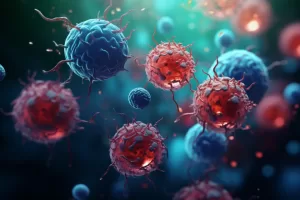Lacking energy can be a sign of an endocrine disorder. For example, fatigue and thyroid issues are closely connected. If you chronically feel like a sapped battery, it could be a signal to check your hormone levels.
We prepared this review to help you navigate the causes of thyroid-related fatigue and solutions for it.
Thyroid Gland: a Brief
The thyroid is a gland that controls many vital processes in your organism. This little butterfly-shaped organ is located in front of your neck, under the larynx (voice box). Its two lobes neatly cuddle the trachea and are connected by a tissue strip at the front.
An average healthy thyroid gland weighs between 20 and 60 grams. It consists of many tiny individual nodules surrounded by connective tissue. Inside them are located follicles—vesicles where the thyroid hormones are stored to be released into the bloodstream.
Hormone synthesis
The thyroid releases three hormones:
- T3, or triiodothyronine.
- T4, or thyroxine.
- Calcitonin.
However, only T3 and T4 are referred to as thyroid hormones. They control energy and overall metabolism, body temperature, heart activity, breathing, mental activity, including cognition and emotions, digestion, skin regeneration, fertility, etc.
Calcitonin serves for bone and calcium metabolism.
How the thyroid influences metabolism
Thyroid hormones increase metabolism and BMR (basal metabolic rate). BMR is the amount of energy your body needs to be alive: pump blood, breathe, digest food, etc. The visible effects of this process include:
- elevated heart rate;
- improved concentration;
- faster reflexes;
- stronger muscles;
- increase of body temperature, etc.
How Thyroid Disorders Lead to Fatigue
Now that you know what impact thyroid hormones have on the body, let us have a closer look at what happens when their production is abnormal.
There are two main types of thyroid disease— hypo- and hyperthyroidism. The prefix reflects the nature of the disorder.
Hypothyroidism
Hypothyroidism is a health issue of insufficient thyroid hormone synthesis.
Causes of Hypothyroidism
The causes of insufficient thyroid function include:
- in-birth defects when the person is being born with a dysfunctional thyroid;
- genetics, or hereditary hypothyroidism that runs in the family;
- thyroiditis, an inflammation of the thyroid gland;
- iodine deficiency (iodine is necessary to produce thyroid hormones);
- Hashimoto’s thyroiditis: an autoimmune condition when the organism produces thyroid antibodies to attack the gland;
- surgery: thyroidectomy is an operation aimed at partial or full removal of the thyroid gland; it can be necessary because of malignant tissue growth, for example. This is why it is common to experience fatigue after thyroid cancer and its surgical treatment.
Symptoms
An individual with hypothyroidism can experience:
- chronic fatigue, getting tired fast, and general weakness are the earliest ones;
- bradycardia (when the heart rate is too slow);
- the movement and speech slow down;
- depression;
- oversleeping;
- the person tolerates cold poorly;
- anemia;
- frequent infections of the respiratory system and UTIs;
- low sex drive;
- decreased production of sweat;
- hair thinning;
- skin dryness;
- constipation;
- weight gain;
- fibromyalgia (muscle pain);
- development of obstructive sleep apnea;
- high cholesterol, etc.
Why hypothyroidism leads to fatigue
We mentioned that thyroid hormones activate your metabolism. Yes, this increases the amount of energy the body needs to operate but also increases the speed of other metabolic processes such as digestion (to release energy). With hypothyroidism, when not enough thyroid hormones are synthesized, your metabolism slows down which causes chronic fatigue.
Hyperthyroidism
Hyperthyroidism is a disorder characterized by overactivity of the thyroid gland and excessive hormone production.
Causes of Hyperthyroidism
Hyperthyroidism may develop as a result of:
- too much iodine intake;
- nodules: abnormal growth of thyroid tissue;
- Grave’s disease: an autoimmune condition that causes up to 70% of hyperthyroidism cases.
Symptoms
The disorder may manifest by the following:
- fatigue (is a general symptom of thyroid disorders although other signs are antagonizing);
- sleep disorders (insomnia, troubled sleep);
- anxiety;
- shaking hands;
- the patient tolerates heat poorly;
- increased appetite and digestive activity;
- diarrhea;
- excessive sweat;
- skin dampness;
- hyperactivity;
- weight loss;
- hair loss, loose nails;
- elevated heart rate (tachycardia);
- heart palpitations, etc.
Why hyperthyroidism leads to fatigue
Hyperthyroidism speeds metabolism too much because the amount of thyroid hormones exceeds the normal. However, fatigue remains a primary symptom of the disorder. This happens because of several reasons:
- Hyperactivity depletes energy too quickly;
- Anxiety leads to quicker exhaustion;
- Insomnia and generally poor sleep prevent rest and energy accumulation.
Diagnostic methods
Thyroid disease can be diagnosed by a primary healthcare provider or a doctor who specializes in endocrine disorders. If you experience troubling symptoms, you need to consult your doctor and go through a medical examination. It can include several diagnostic procedures.
Blood tests
Taking blood samples will allow doctors to estimate the levels of thyroid hormones in your system. If they are lower or higher than normal, it can be a foundation for the diagnosis.
Imaging
An ultrasound, computer tomography, or radionuclide scans provide an image of the thyroid. This allows medical professionals to examine the organ structure to find abnormalities (increased size, tissue growth, pathological findings of thyroid nodules, inclusions, etc.).
Physical exam
The technique called palpation (probing with one’s fingers) helps to assess the size of the gland, the structure and consistency of nodules, etc. Physical exam includes evaluation of other marks of hormone imbalance that are visible to the naked eye, for example, skin dryness.
Treatment for Thyroid and Fatigue
The treatment plan should take into account the nature of the disorder and address the illness in the first place.
Hormone replacement therapy
To treat hypothyroidism, the patient takes synthetic hormones that replenish the existing deficit, such as levothyroxine. This therapy compensates for underactive thyroid which improves the patient’s condition.
Radioactive iodine and anti-thyroid medication
If the thyroid is overactive, the hormone synthesis is inhibited by anti-thyroid medicine, such as methimazole, and radioactive iodine.
Therapy
CBT and other variants of psychotherapy help the patient to gradually restore physical activity and feel more motivated and energetic. It also promotes management of depressive symptoms that worsen thyroid fatigue.
In the event of fatigue after thyroid surgery, therapy contributes to the psychological recovery after battling a severe illness and undergoing an operation.
Lifestyle against fatigue
Certain habits and ways of life fill you with energy while other can drain you from it. Here are some recommedations to stay strong and resilient.
Diet Tips
Your nutrition is your main source of energy. So give your diet and eating habits extra attention for maximum benefits.
- Do not skip eating in the morning. Breakfast is your kickstart to an active day.
- Avoid hunger. Instead of eating once a day but plenty, keep a routine of several meals and healthy snacks in-between. This will support your metabolic rate.
- Drink water. Water is essential for proper course of many vital chemical processes in your body.
- Avoid refined carbs. They mess with your insulin levels and metabolism in general. Moreover, you will feel hungry soon after you ate.
- Nutrients are important. Make sure you get all the necessary amounts of minerals, vitamins, fiber, and amino acids to provide fuel for healthy operation of all your body systems. Do not forget to balance macronutrients, such as fats and proteins, as well.
Regular Physical Activity
Physical activity tires you but it prepares your body for the next session by giving it more stamina! Moreover, it builds up your muscle and improves mood, cardiovascular health, immune system, and general well-being. It is a real health pill plus it can be free!
Stress Management
Stress is a huge contributing factor to many health issues, endocrine disorders not an exception. Chronic stress exhausts you both physically and emotionally and makes you prone to diseases. Knowing your limits, establishing boundaries, giving yourself time to rest, and working through current issues helps you stay on the distance.
Summary
Fatigue is a primary and universal sign of thyroid disorders. It is easy to notice but equally easy to misdiagnose. If the individual struggles with chronic fatigue or experiences it in combination with other symptoms, we recommend consulting a doctor for diagnosis and treatment. Fatigue after thyroid removal is also a sign of hormone disbalance that should be addressed.
FAQ
What does thyroid fatigue feel like?
Thyroid issues cause chronic fatigue with oversleeping or poor sleep, weakness, and fast exhaustion.
Can thyroid problems cause extreme fatigue?
Yes; however, it depends on the general person’s health and severity of the condition.
How do you overcome thyroid tiredness?
Altering your lifestyle to make it healthier (nutrition, sports, stress and sleep management) and treating the source of the problem (the illness) provide good results.
What are the early warning signs of thyroid problems?
Persistent tiredness and mood disorders are usually the first ones to occur.
How long does thyroid fatigue last?
Thyroid fatigue persists until the disorder is managed.




